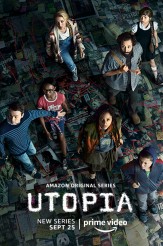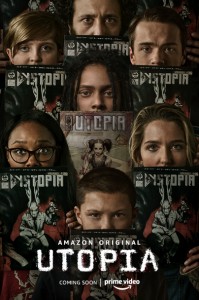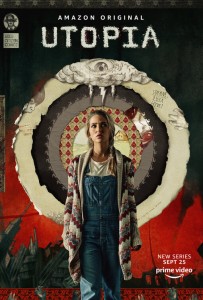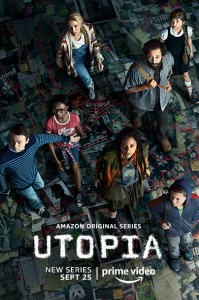UTOPIA premieres the first of its Season 1 eight episodes on Amazon Prime on Friday, September 25. Executive producer Gillian Flynn, who wrote all eight hours, adapted UTOPIA from the British series created by Dennis Kelly, which ran in the U.K. 2013 and 2014.
Flynn’s UTOPIA introduces us to a group of friends who are fans of the comic book series DYSTOPIA. Idealistic Sam (Jessica Rothe), obsessive conspiracy theorist Wilson (Desmin Borges), ailing Becky (Ashleigh LaThrop), and easily-started Ian (Dan Byrd) come together at a convention in hopes of purchasing the only copies of the newly-found DYSTOPIA sequel, UTOPIA. The group already suspects that both comics provide cryptic hints to real-world events. At first, they don’t know that the main character in the comics, Jessica Hyde (Sasha Lane) is a dangerous real person, and that even more dangerous people are determined to obtain UTOPIA and eliminate anyone who has seen it.
At the same time, a deadly outbreak is affecting schoolchildren in communities throughout the South. Researcher Michael Stearns (Rainn Wilson) thinks he may have discovered the cure, which biotech mogul Kevin Christie (John Cusack) wants to push through as fast as possible.
Flynn, originally Missouri, is the author of the bestselling novels SHARP OBJECTS and GONE GIRL. Flynn wrote and executive produced the HBO miniseries adaptation of SHARP OBJECTS, and wrote the screenplay for the 2014 film version of GONE GIRL.
This combines Flynn’s comments during a Q&A session from Amazon’s portion of the Television Critics Association (TCA) Summer 2020 press tour via online conference, and a subsequent roundtable interview.
Flynn says that what she liked about the original U.K. UTOPIA was that it “was so rich, the world was so big. It had to do with a lot of things that we’re dealing with right now in this world, it had that edginess to it. I think we all feel a sense of unease, that societally, we’re coming to some sort of crisis-end-of-things, on so many different fronts, and that was back in 2013, when I saw it. So I thought there was a lot to work with there. I liked that it would kind of force me to challenge myself as a writer, because the world was so big, whereas the stuff I write is often very character-driven, much more insular, it’s about what happens between people behind closed doors, between two people, a husband and wife, or a mother and daughter, or friends. I liked that this was an ensemble, and it was taking place as almost a road trip in the big, wide world.”
The comic book aspect of UTOPIA struck a chord with Flynn. “I’ll tell you the truth, I grew up as a total comic book nerd. My dad literally made his living, in addition to being a teacher, off of comic books. He would drag me to flea markets all over the weekend, and we would go hunting for comic books, and I grew up specifically on EC [horror] comic books. That was the coin of the realm in my household.”
What was Flynn’s biggest challenge in adapting a U.S. version of UTOPIA? “I think it was just getting over the starting of it, and realizing it had to become its own thing, it had to become its own show. I really respected and loved what Dennis Kelly had done, but why bother doing a remake if it’s exactly the same, or too close to what it was? And on top of it, knowing that it was such a cult hit in Britain, and people don’t love it when you mess with their cults that much – I know I certainly don’t,” she laughs, “and that I was going to have to get past people having their arms folded across their chests, if they loved that original. Once I was able to put that on a shelf, and thankfully, Dennis Kelly is such a gent that he was consistently always like, any time I sent him a new version, he was like, ‘Remake it, remake it. Don’t worry about it.’ So much more gracious than I ever would be if someone started messing around with my stuff. And so, once I got past all that, I was really about to just fully enjoy the experience.”
Amazon Prime seems like the right home for UTOPIA to Flynn, who began developing the project for HBO back in 2014. “It was hard. It was pure Missouri stubbornness that I just couldn’t quite let it go. And it was so gratifying. It reminded me a lot of my experience of getting my first book published, which was SHARP OBJECTS, where I kept hearing over and over again the same thing, which was, ‘This is a dark book about women. Men don’t like to read books about women, and women don’t like to read books about women that they don’t like, who don’t inspire them.’ And I kept thinking, I don’t think that’s true’,” she laughs. “ ‘I don’t think I believe that.’ And this was a similar thing, which was, ‘It’s too dark, it’s too, too, too,’ and thankfully then it wound up at Amazon. They were like, ‘It’s too everything! Come, you’re home.’ So I’m grateful.”
Jessica Hyde is not a typical sympathetic female teen protagonist. There are other characters who are likewise morally ambiguous. “I looked at it as a real opportunity,” says Flynn. “I’ve been asked a few times if there’s a particular character that I identify with more than others. That’s what I love so much about the opportunity to do an ensemble is, I guess I can write villains, because I kind of have empathy for all my characters, and so [there are] those little slices of my opinion in all these different characters. I’m kind of cynical like Ian, I’m a little bit of a believer like Wilson. If you catch me early in the morning before coffee, I may shoot you like Jessica Hyde. I did like that there was this Jessica Hyde character, who is kind of feral, but who ultimately, over the course of the series, hopefully, you start to understand why she is the way she is, and to sense her humanity a little bit.
“That’s always my favorite thing to do with an audience, is just like the way you are kind of rooting for Hannibal Lecter at the end of SILENCE OF THE LAMBS, and he escapes, and you’re like, ‘Yeah, Lecter! Wait, he’s a cannibal.’ I love that feeling of where you’re identifying with someone you kind of know you shouldn’t, but to me, that’s a reminder that you can usually find some kind of common ground. I’m going to sound Pollyanna-ish, but [this may be] a good time for this right now, realizing that there is a piece of humanity to be salvaged in each of us. I think it’s a good reminder.”
UTOPIA has a fair amount of violence. Flynn relates, “I am often less-is-more as far as violence goes. I’m the person who loves that moment in ROSEMARY’S BABY, where we’re only seeing part of the conversation, and the whole audience is trying to look around the corner to see what’s happening. Or obviously JAWS. So I’m a big believer in that. I don’t want it for cartoon effect. I don’t want it necessarily for shock value, because I think we as an audience are kind of past most of that as pure shock value. So I want to use violence when it’s effective, and when it’s appropriate and correct. It’s sort of like porn – it’s everyone’s decision as to what that line is.
“For me it’s, does this push forward the story? Do we need to see it or do we not For instance, some things I do want the audience to be squirming right along with the characters. I do want the audience to feel that discomfort. Me wanting it to feel grounded in a true world was choosing when to and when not to show violence, and choosing when and when not to have that moment so that you are afraid, so that you do feel for these characters. This is the first time a lot of them have really been out in the big wide world, as far as any sort of real risk. There are people who are really cerebral, often having lived a lot online, except for Jessica, who’s the exact opposite. She’s lived entirely way too much in the real world, and so she’s very comfortable with violence. So it was interesting to draw the lines from those different ways. Who is comfortable with violence, and who is shocked?”
Many of the characters in UTOPIA have suffered childhood trauma; in the cases of young characters Grant (Javon “Wanna” Walton) and Alice (Farrah Mackenzie), they’re experiencing it throughout the story. This is a theme that matters to Flynn. “The show to me is a lot about the choices that we’re making as humans right now – how we treat the environment, how we treat each other, how we handle the future. There’s no better indication of that than how we treat our children. How are we raising the next generation? What values are we giving them? What values are we modeling for them? When they sit down to the dinner table, and Alice’s mom says, ‘Nelson Mandela said, “There’s no greater show of a society’s soul than how it treats its children.”’ I really believe that. We give a lot of lip service about, ‘Children are our future, and we should cherish them, and then you see in action the choices that we’re making as a society, and that’s actually not true at all. So it is a very specific choice on my part.”
There have now been several onscreen stories about characters who have been prompted by media – books or TV or films – to embark upon a quest. What did Flynn do to incorporate that dynamic into UTOPIA, yet keep it distinctive?
“For me, one of the big, important things was to understand why, aside from saving the world, that these people were initially so interested in these two graphic novels, DYSTOPIA and the sequel UTOPIA. It was really important to see [the artwork]. I wanted it not to feel like a maguffin, for people to be able to look at it and get pulled into it. There was this artist who I absolutely love named Gerald Ruiz, who had done a lot of stuff for Bill Willingham’s FABLES, who I’d always really admired. He’s like Arthur Rackham on acid, just does these amazing, disturbing fairytale images of children and animals that have come to life. And I knew right from the beginning that he was the person I wanted, so we would send him panels describing the imagery. He’s based in Brazil, and he would send back these originals that you could feel and touch, and we were able to hide Easter eggs within the panels, to have this extra layer of fun, so that you could look at it and enjoy it, but also that you could also find different clues as you were going along. It was really fun, and I thought that was really helpful. I didn’t want people to see just a flash of it, and not quite get why it had this spotlight. I think he’s such an incredibly talented human being that it’ll come across.”
Pandemic, the fear of its spread, and the possibility of ineffective cures being foisted upon the public are all part of UTOPIA. Does Flynn think that aspect of the story plays differently, now that the real world is in the midst of COVID-19?
“Sure. I don’t know how it couldn’t, is the short answer. It was shocking, because when I started writing this, the pandemic portion of the storyline felt very science fiction to me, and I had a lot of questions of, ‘Will this play as science fiction?’ And it was like, ‘No, no, no, I’m taking my cues from paranoia thrillers of the ‘70s. That’s where this is from.’ There was a little bit of a sell even in that, because when we were all smug Americans who believed that a pandemic hadn’t happened in a hundred years, and wouldn’t happen here.
“We finished filming in 2019, and then I was in the middle of edits, and all of a sudden, I remember, I was flying back and forth to L.A., where all the editing bays were, and I said, See you guys next week,’ and within two weeks, it was all shut down, and I was editing on my laptop from home, and going from these scenes of a hot zone to the twenty-four-hour news that was on all the time, and seeing these way-too-resonant scenes. Nothing was rewritten, nothing was tweaked. I can honestly say that after it happened, I didn’t want to even have to answer that question in the affirmative, but yeah. To me, the pandemic [within UTOPIA] is just part of a larger conspiracy, and as part of the story, one of the plotlines. I certainly wasn’t setting out to do a medical procedural like OUTBREAK.”
Not knowing the ending of UTOPIA Season 1, can there be a Season 2? If so, does Flynn want to do it? “I would love for there to be a Season 2. It does leave room for a Season 2. I had always intended it to be more than one season, and I would totally be up for that. You’ll find that Episode 8 finalizes and gives answers to a lot of the mythology of where Jessica came from, who Artemis is, what Home is, why Home is. You’ll get a lot of answers, while leaving a lot of room to play. I’m ready to play.”
Related: Interview with UTOPIA star John Cusack on Season 1 of the Amazon series
Follow us on Twitter at ASSIGNMENT X
Like us on Facebook at ASSIGNMENT X
Article Source: Assignment X
Article: Interview with creator and executive producer Gillian Flynn on Season 1 of UTOPIA
Related Posts:














